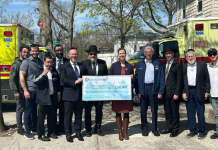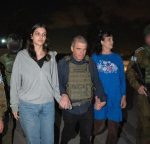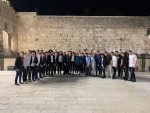By Gila Arnold
Gila Arnold: What is PUAH in a nutshell?
LD: PUAH is the a Jewish fertility support organization, and it helps couples build families through its expert and unique synthesis of rabbinical and medical knowledge. As the world’s leading expert on fertility and halachah, it provides personalized guidance and support for each individual in need of its services.
Gila Arnold: What motivated the launch of the North American branch of the organization?
Lea Davidson: Rav Menachem Burstein, shlita, founded PUAH in Israel back in 1980, and I later launched its North American branch. Back then, my family was living in Israel, where I was privileged to work for PUAH. When we moved to New York in 2004, halachic supervision services was one of the first vital services we introduced. (Halachic supervision ensures that a trained person — a halachic witness — is present during all treatment or lab procedures involving the transfer of genetic material, which is vital for preserving halachic yichus.)
I was excited to expand PUAH to the American community. We hired our first supervisors, Rivky Itzkowitz and Ahuva Goldstein, and began introducing the concept of supervision to the major fertility centers. Today, Mrs. Itzkowitz and Mrs. Goldstein are our directors of supervision, and oversee a team of 61 members throughout the United States and Canada, and Rabbi Elan Segelman leads our rabbinical team.
We also developed our special brand of educational outreach. In order to help as many people as possible, we set out to teach the teachers. The PUAH rabbinical advisors are the world’s foremost experts on the halachos of fertility. We started by reaching out to community rabbanim, rebbetzins, and kallah teachers, who are in the position to guide couples coming to them for advice. We brought education about fertility health to the public, raising awareness, and breaking the stigma of infertility. Today, we have lectures, conferences, and awareness events across the country, for rabbis, community members, college students, medical professionals, and more.
GA: What is your current role at PUAH US?
LD: My official title is executive director. My real job is what I call “Find the need and fill it.” PUAH US has expanded tremendously over the past decade and a half, as I kept coming across new needs that would help our couples on their journey to parenthood. This includes adding rabbinical counselors to our American team, developing educational workshops and conferences, opening our taharas hamishpachah hotline, and more.
GA: What is one great challenge you face in running the organization?
LD: Our main challenge is the same one that all nonprofit organizations face: fundraising. However, a fertility organization has an added dimension of difficulty. As infertility is a particularly sensitive issue, it’s rare to find people willing to share their experiences with the world, and difficult to discuss some of these topics publicly. And, as we know, testimonials and word of mouth recommendations are the cornerstone of most marketing efforts.
Another publicity challenge is to distill what we do into one succinct sentence — the famous elevator pitch. Yes, we help families have babies, but that doesn’t begin to express the huge scope of assistance that this entails.
GA: Can you share a story that highlights the work you do?
LD: One night recently, one of our rabbinic advisors got a phone call from a couple he’d been helping. It was close to midnight, he had already retired for the night, and they had an appointment scheduled for the next day, so it was tempting to decide to wait until the morning to speak. But he was concerned that if they were calling so late at night there must be a reason for the urgency, so he got out of bed and took the call.
It turned out that they were confused about their doctor’s instructions regarding a certain medication, and weren’t sure if it should be taken in the night or in the morning. Our rabbinic adviser clarified the instructions for them, and after that, they were all able to sleep soundly.
This medical expertise combined with a deep caring for every couple’s welfare is exactly what we do best.
GA: Can you share a positive story that you’ve recently experienced?
LD: We had an amazing hashgachah pratis story that happened not so long ago. A woman had gone for a routine ultrasound where she discovered that her baby had a severe form of spina bifida — a neural tube disorder in which the spinal canal is open and the nerves push out of the vertebrae. Her doctor recommended they terminate the pregnancy, and, extremely distraught, she came to consult with one of our rabbinic advisers.
The rav first explained what this condition is and confirmed that, until now, there had been no cure for it. Then he smiled and said, “But I have some good news for you. Just the other day, a friend of mine came back from a medical course in Brazil, where he learned how to perform in-utero surgery to correct spina bifida.”
The rav got them an immediate appointment with this surgeon, and he was able to close up the fetus’s spinal cord. Their baby was born perfectly healthy.
Our advisers make it their business to keep up on the most cutting-edge technologies in the field of fertility and prenatal care. This knowledge, together with their connections to some of the world’s top medical professionals (we have a special PUAH referral network for fertility specialists), means that couples who were told elsewhere that they have no hope of having children come to PUAH and suddenly discover that there is hope. This happens every single day.
GA: What do you wish people would know about infertility?
LD: While the statistic commonly cited is that one in seven couples face infertility challenges, it’s important to realize that the vast majority of these challenges can be surmounted — whether it’s through nutrition, medication, or simple medical procedures. Less than five percent of couples end up needing invasive fertility procedures like IVF. The journey is complex, but we are dedicated to help you find a solution. It’s so important for couples to get guidance about any issues they are having, rather than struggle alone. We are here to help for every issue, great or small. Today, in 2019, there are so many medical solutions for infertility; no one should ever feel their situation is hopeless.
GA: What was the most interesting request you’ve ever received on behalf of a couple?
LD: Fertility treatments are based on very precise timing, and patients must be ready to run to the lab for a test as soon as they get a phone call. This means that anyone on our team must also be ready to drop everything and travel, sometimes for hours, to supervise these procedures. These wonderful people have even spent Shabbos away from home just to be available for a 10-minute lab supervision.
I think our wildest supervision excursion was when a team member got a phone call one afternoon from Mrs. Itzkowitz, our director of supervision, saying that a supervisor was needed in Panama the next morning. This woman, who’d been in the middle of supervising a procedure at a Manhattan clinic, called her husband to book a flight, and rushed home to pack.
When she arrived at the airport, she was dismayed to see long check-in lines. Afraid she would miss her flight, she pulled out her PUAH ID and announced, “Medical emergency!” She made it on time to Panama and, at the end of the story, a healthy baby was born to the grateful parents.
GA: What’s the best part of your work? The toughest?
LD: The best part is, obviously, the babies. The shining faces when we hear that a woman is expecting, the mazel tovs when she gives birth — these are what keep us going.
The toughest parts are the failed treatments and miscarriages. My heart breaks each time. We are here for each person, to offer them emotional support in these painful times.
GA: How do you manage the stress that comes along with your taxing work?
LD: I absolutely love what I do; when I’m at work, I never feel tired. The only stress I feel is financial—how will we accomplish everything we need to do? I’ve seen so much siyata d’Shmaya over the years. Time and again, when a couple with a particularly difficult case has a baby, it reminds me that Hashem is the One who gives life. Our job is just to try everything we can to help, and to never give up.
GA: What was the best compliment you’ve ever received?
LD: When a woman approached me and cried, “My children are all thanks to you!”
Another woman once introduced me to her kids as “Tante Lea.” It still warms my heart to think of that!
Even months after we run a conference, I’ll have couples come tell me that, thanks to the information we presented, they were able to take appropriate interventional steps. It’s both empowering and humbling to know that Hashem gave us the zechus to be the vehicle for bringing thousands of Jewish babies into this world.
Some details have been changed to protect privacy.
This article first appeared in Wellspring.















